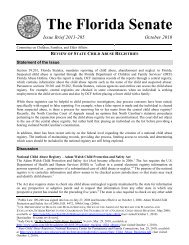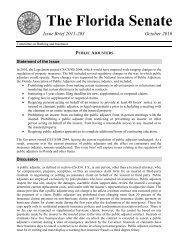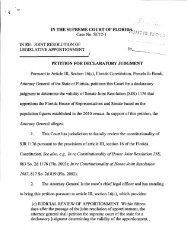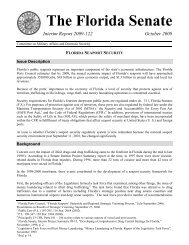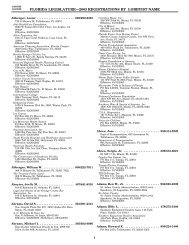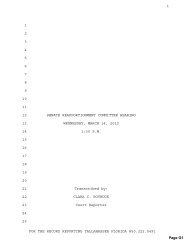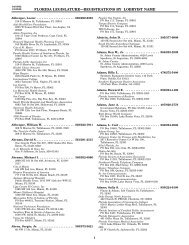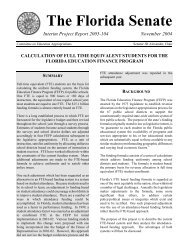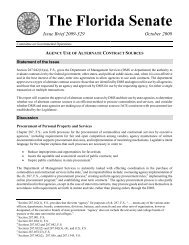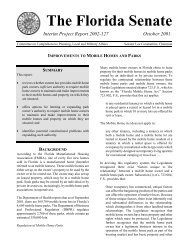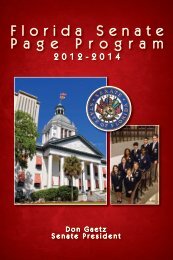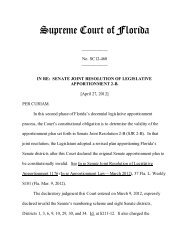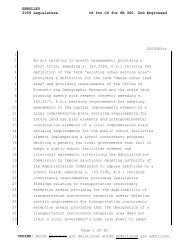"Juvenile Sexual Offender" in Chapter 985, FS - The Florida Senate
"Juvenile Sexual Offender" in Chapter 985, FS - The Florida Senate
"Juvenile Sexual Offender" in Chapter 985, FS - The Florida Senate
Create successful ePaper yourself
Turn your PDF publications into a flip-book with our unique Google optimized e-Paper software.
Exam<strong>in</strong>e the Def<strong>in</strong>ition of "<strong>Juvenile</strong> <strong>Sexual</strong> Offender" <strong>in</strong> <strong>Chapter</strong> <strong>985</strong>, F.S. Page 3<br />
‣ Impose a juvenile sexual offender communitybased<br />
treatment alternative disposition. In order to<br />
utilize this alternative disposition, the court must<br />
first consider: (a) a proposed plan of the<br />
community-based treatment from the DJJ; (b)<br />
whether the offender and community will benefit<br />
from imposition of community-based treatment;<br />
and (c) the victim’s or victim’s family’s op<strong>in</strong>ion of<br />
whether the offender should receive communitybased<br />
treatment. Upon f<strong>in</strong>d<strong>in</strong>g that a communitybased<br />
alternative disposition is appropriate, the<br />
court may place the offender on community<br />
supervision for up to three years and impose<br />
conditions that require the offender to: (a) undergo<br />
outpatient juvenile sexual offender treatment; (b)<br />
rema<strong>in</strong> with<strong>in</strong> prescribed geographical boundaries;<br />
and (c) comply with all requirements of the<br />
treatment plan. If the offender violates any<br />
condition or if the court f<strong>in</strong>ds that the juvenile is<br />
fail<strong>in</strong>g to make satisfactory progress <strong>in</strong> treatment,<br />
the court may revoke the community-based<br />
treatment alternative and commit the offender to<br />
the DJJ. 6<br />
‣ Commit the juvenile sexual offender to the DJJ for<br />
placement <strong>in</strong> a juvenile sexual offender<br />
commitment program under s. <strong>985</strong>.308, F.S. This<br />
section authorizes the DJJ, subject to<br />
appropriation, to operate or contract for juvenile<br />
sexual offender commitment programs, which<br />
must <strong>in</strong>clude educational components, life<br />
management tra<strong>in</strong><strong>in</strong>g, substance abuse treatment,<br />
and <strong>in</strong>tensive psychological treatment.<br />
<strong>The</strong> statutory def<strong>in</strong>ition of juvenile sexual offender and<br />
the other provisions sett<strong>in</strong>g forth the policy and<br />
procedures govern<strong>in</strong>g these juveniles resulted from<br />
recommendations by the 1995 Task Force on <strong>Juvenile</strong><br />
<strong>Sexual</strong> Offenders and Victims of <strong>Juvenile</strong> <strong>Sexual</strong><br />
Abuse and Crimes. Dur<strong>in</strong>g the 1995 Regular<br />
Legislative Session, the Legislature passed a bill<br />
<strong>in</strong>corporat<strong>in</strong>g <strong>in</strong>to law some of these recommendations<br />
by the Task Force, which provided for a more effective<br />
and uniform response to juvenile sexual abuse. 7 This<br />
Task Force was created the year before by the<br />
Legislature to study the issue of juvenile sexual abuse<br />
and report back to the Legislature with f<strong>in</strong>d<strong>in</strong>gs and<br />
recommendations. 8 Accord<strong>in</strong>g to the 1995 Task Force,<br />
the def<strong>in</strong>ition of juvenile sexual offender mirrored the<br />
6 s. <strong>985</strong>.231(3), F.S.<br />
7 CS/HB 2023, Ch. 95-266, Laws of <strong>Florida</strong>.<br />
8 Section 111, ch. 94-209, Laws of <strong>Florida</strong>.<br />
one suggested by the National Task Force on <strong>Juvenile</strong><br />
Sex Offend<strong>in</strong>g <strong>in</strong> its 1993 revised report. 9<br />
Nowhere <strong>in</strong> these statutory provisions does it require<br />
the court to pronounce that a juvenile is a “juvenile<br />
sexual offender” for any purpose, <strong>in</strong>clud<strong>in</strong>g<br />
disposition, evaluation, treatment, or registration.<br />
However, if the court decides to reta<strong>in</strong> jurisdiction over<br />
the juvenile until he or she completes the residential<br />
sex offender commitment program up until the juvenile<br />
turns 21 years old, the court <strong>in</strong>cludes this f<strong>in</strong>d<strong>in</strong>g <strong>in</strong> its<br />
order. 10<br />
Unlike the adult system <strong>in</strong> which a sexual offense<br />
conviction requires the adult offender to register as a<br />
sexual offender or predator under the <strong>Florida</strong> <strong>Sexual</strong><br />
Predator Act <strong>in</strong> the juvenile system, an adjudication of<br />
del<strong>in</strong>quency for a sexual offense does not require such<br />
registration. However, if a juvenile is transferred to the<br />
adult system, and is sanctioned as an adult, rather than<br />
as a juvenile, then that youth is required to register as a<br />
sexual offender or predator under s. 943.0435 or<br />
s. 775.21, F.S. 11 Several prosecutors <strong>in</strong>dicated that they<br />
typically transfer the most serious juvenile sexual<br />
offenders <strong>in</strong>to the adult system where, if convicted,<br />
they will be <strong>in</strong>cluded on the sexual offender or predator<br />
registration list.<br />
Although the adult registration requirements are not<br />
applicable to a juvenile who is adjudicated del<strong>in</strong>quent<br />
for a sexual offense, the DJJ is required under ch. <strong>985</strong>,<br />
F.S., to notify the schools, parents or legal guardians of<br />
victims, and law enforcement agencies when a juvenile<br />
sexual offender returns to the community. 12<br />
Just as the adult registration requirements are not<br />
applicable to the majority of juveniles under 18 years<br />
of age, neither are the provisions of the <strong>Sexual</strong>ly<br />
Violent Predator Act (commonly known as the “Jimmy<br />
Ryce Act”), which allows for <strong>in</strong>voluntary civil<br />
9 Revised Report from the National Task Force on<br />
<strong>Juvenile</strong> Sex Offend<strong>in</strong>g, 1993.<br />
10 s. <strong>985</strong>.201, F.S.<br />
11 State v. J.M., 824 So. 2d 105 (Fla. 2002) (<strong>Florida</strong><br />
Supreme Court held that juveniles charged as adults but<br />
adjudicated as del<strong>in</strong>quents are not “crim<strong>in</strong>ally convicted”<br />
for purpose of sexual predator designation under the<br />
<strong>Sexual</strong> Predator Act.)<br />
12 s. <strong>985</strong>.04(3)(b), F.S., (notification also applies to<br />
juveniles under the DJJ custody with a known history of<br />
crim<strong>in</strong>al sexual behavior with other juveniles, or a<br />
juvenile who has pled guilty or nolo contendere to or been<br />
found to have committed certa<strong>in</strong> sexual offenses,<br />
regardless of adjudication) and <strong>985</strong>.308(1)(d), (6), F.S.



